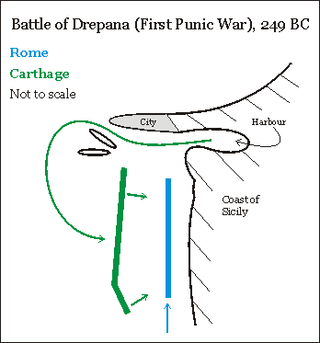Related Research Articles

The First Punic War was the first of three wars fought between Rome and Carthage, the two main powers of the western Mediterranean in the early 3rd century BC. For 23 years, in the longest continuous conflict and greatest naval war of antiquity, the two powers struggled for supremacy. The war was fought primarily on the Mediterranean island of Sicily and its surrounding waters, and also in North Africa. After immense losses on both sides, the Carthaginians were defeated.

This article concerns the period 49 BC – 40 BC.

This article concerns the 200 BC decade, that lasted from 209 BC to 200 BC.
This article concerns the period 269 BC – 260 BC.
This article concerns the period 249 BC – 240 BC.
This article concerns the period 219 BC – 210 BC.
Year 249 BC was a year of the pre-Julian Roman calendar. At the time it was known as the Year of the Consulship of Pulcher and Pullus. The denomination 249 BC for this year has been used since the early medieval period, when the Anno Domini calendar era became the prevalent method in Europe for naming years.

The gens Claudia, sometimes written Clodia, was one of the most prominent patrician houses at ancient Rome. The gens traced its origin to the earliest days of the Roman Republic. The first of the Claudii to obtain the consulship was Appius Claudius Sabinus Regillensis, in 495 BC, and from that time its members frequently held the highest offices of the state, both under the Republic and in imperial times.

Adherbal, also known as Atarbas, was the admiral of the Carthaginian fleet which battled the Romans for domination of the Mediterranean Sea during the First Punic War. Polybius identified Adherbal during the Battle of Drepana as the Carthaginian commander-in-chief. He led the Carthaginian fleet to Drepana in Sicily and inflicted a crushing defeat on the Roman consul P. Claudius Pulcher during the naval battle in 249 BC.
Publius Claudius Pulcher was a Roman politician.
The naval Battle of Drepana took place in 249 BC during the First Punic War near Drepana in western Sicily, between a Carthaginian fleet under Adherbal and a Roman fleet commanded by Publius Claudius Pulcher.

The gens Junia or Iunia was one of the most celebrated families of ancient Rome. The gens may originally have been patrician, and was already prominent in the last days of the Roman monarchy. Lucius Junius Brutus was the nephew of Lucius Tarquinius Superbus, the seventh and last King of Rome, and on the expulsion of Tarquin in 509 BC, he became one of the first consuls of the Roman Republic.
Appius Claudius Pulcher was a Roman general and politician of the 3rd century BC, active in the Second Punic War.
Appius Claudius Pulcher was a Roman noble, general and politician of the 1st century BC. He was the father of a number of renowned Romans, most notable: the infamous Clodius and Clodia.
Carthalo was an officer in Hannibal's army during the Second Punic War.
Publius Sempronius C.f. Tuditanus was a Roman Republican consul and censor, best known for leading about 600 men to safety at Cannae in August, 216 BC and for the Treaty of Phoenice which ended the First Macedonian War, in 205 BC.
The naval Battle of Phintias took place in 249 BC during the First Punic War near modern Licata, southern Sicily between the fleets of Carthage under Carthalo and the Roman Republic under Lucius Junius Pullus. The Carthaginian fleet had intercepted the Roman Fleet off Phintias, and had forced it to seek shelter. Carthalo, who heeded the warning of his pilots about impending storms, retired to the east to avoid the coming weather. The Roman fleet did not take any precautions and subsequently was destroyed with the loss of all but two ships. The Carthaginians exploited their victory by raiding the coasts of Roman Italy until 243 BC. The Romans did not mount a major naval effort until 242 BC.
References
- The information on this page was translated from its Spanish equivalent.
- ↑ Polybius i. 52-55; Diodorus Siculus Frag. XXIV. 1; Eutropius ii. 15. S. 26, Orosius iv. 10; Valerius Maximus I. 4. § 3; Cicero de Div. i. 16, ii. 8, 33, de Nat. Deor. ii. 3; Censorinus Die Nat. 17.